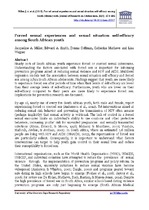| dc.contributor.author | Miller, Jacqueline A. | |
| dc.contributor.author | Smith, Edward A. | |
| dc.contributor.author | Coffman, Donna | |
| dc.contributor.author | Mathews, Catherine | |
| dc.contributor.author | Wegner, Lisa | |
| dc.date.accessioned | 2017-07-07T12:32:06Z | |
| dc.date.available | 2017-07-07T12:32:06Z | |
| dc.date.issued | 2015 | |
| dc.identifier.citation | Miller, J. A. et al. (2015). Forced sexual experiences and sexual situation self-efficacy among South African youth. Journal of Research on Adolescence, 26(4): 673-686 | en_US |
| dc.identifier.issn | 1050-8392 | |
| dc.identifier.uri | http://hdl.handle.net/10566/3053 | |
| dc.identifier.uri | http://dx.doi.org/10.1111/jora.12217 | |
| dc.description.abstract | Nearly 20% of South African youth experience forced or coerced sexual intercourse. Understanding the factors associated
with forced sex is important for informing prevention programs aimed at reducing sexual violence and HIV and
AIDS. Multilevel regression models test the association between sexual situation self-efficacy and forced sex among
2,893 South African adolescents. Findings suggest that youth are more likely to experience forced sex after periods of
time when their levels of self-efficacy are lower than their average levels of self-efficacy. Furthermore, youth who are
lower on their self-efficacy compared to their peers are more likely to experience forced sex. Implications for prevention
research are discussed. | en_US |
| dc.language.iso | en | en_US |
| dc.publisher | Wiley | en_US |
| dc.rights | This is the author-version of the article published online at: http://dx.doi.org/10.1111/jora.12217 | |
| dc.subject | Sexual experiences | en_US |
| dc.subject | Forced | en_US |
| dc.subject | Self-efficacy | en_US |
| dc.subject | Youth | en_US |
| dc.subject | South Africa | en_US |
| dc.subject | Sexual violence | en_US |
| dc.title | Forced sexual experiences and sexual situation self-efficacy among South African youth | en_US |
| dc.type | Article | en_US |
| dc.privacy.showsubmitter | FALSE | |
| dc.status.ispeerreviewed | TRUE | |
| dc.description.accreditation | ISI | |

